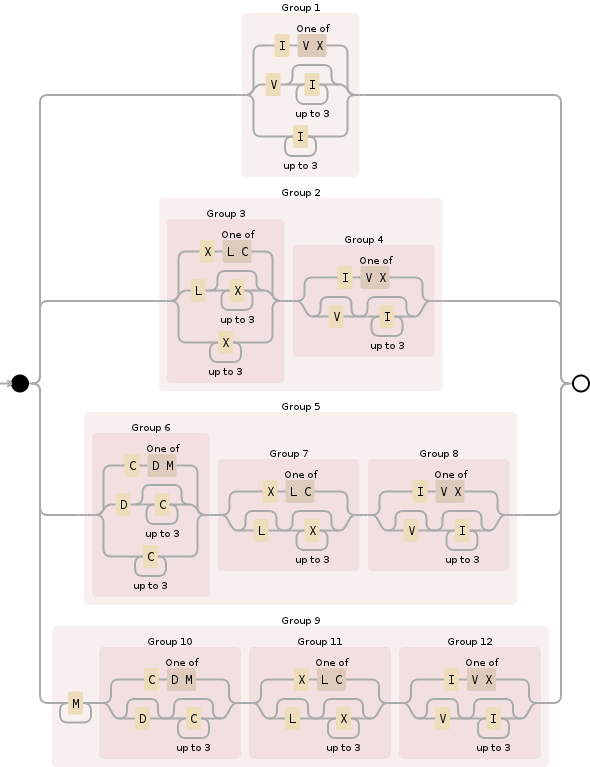Vous pouvez utiliser l'expression régulière suivante pour cela:
^M{0,4}(CM|CD|D?C{0,3})(XC|XL|L?X{0,3})(IX|IV|V?I{0,3})$
Le décomposer, M{0,4}spécifie la section des milliers et la restreint essentiellement entre 0et 4000. C'est un moyen relativement simple:
0: <empty> matched by M{0}
1000: M matched by M{1}
2000: MM matched by M{2}
3000: MMM matched by M{3}
4000: MMMM matched by M{4}
Vous pouvez, bien sûr, utiliser quelque chose comme M*autoriser n'importe quel nombre (y compris zéro) de milliers, si vous voulez autoriser des nombres plus grands.
Ensuite (CM|CD|D?C{0,3}), un peu plus complexe, c'est pour la section des centaines et couvre toutes les possibilités:
0: <empty> matched by D?C{0} (with D not there)
100: C matched by D?C{1} (with D not there)
200: CC matched by D?C{2} (with D not there)
300: CCC matched by D?C{3} (with D not there)
400: CD matched by CD
500: D matched by D?C{0} (with D there)
600: DC matched by D?C{1} (with D there)
700: DCC matched by D?C{2} (with D there)
800: DCCC matched by D?C{3} (with D there)
900: CM matched by CM
Troisièmement, (XC|XL|L?X{0,3})suit les mêmes règles que la section précédente mais pour la place des dizaines:
0: <empty> matched by L?X{0} (with L not there)
10: X matched by L?X{1} (with L not there)
20: XX matched by L?X{2} (with L not there)
30: XXX matched by L?X{3} (with L not there)
40: XL matched by XL
50: L matched by L?X{0} (with L there)
60: LX matched by L?X{1} (with L there)
70: LXX matched by L?X{2} (with L there)
80: LXXX matched by L?X{3} (with L there)
90: XC matched by XC
Et, enfin, (IX|IV|V?I{0,3})la section des unités, traitant à 0travers 9et également similaire aux deux sections précédentes (les chiffres romains, malgré leur apparente bizarrerie, suivent certaines règles logiques une fois que vous avez compris ce qu'ils sont):
0: <empty> matched by V?I{0} (with V not there)
1: I matched by V?I{1} (with V not there)
2: II matched by V?I{2} (with V not there)
3: III matched by V?I{3} (with V not there)
4: IV matched by IV
5: V matched by V?I{0} (with V there)
6: VI matched by V?I{1} (with V there)
7: VII matched by V?I{2} (with V there)
8: VIII matched by V?I{3} (with V there)
9: IX matched by IX
Gardez simplement à l'esprit que cette expression régulière correspondra également à une chaîne vide. Si vous ne le souhaitez pas (et que votre moteur regex est suffisamment moderne), vous pouvez utiliser une anticipation et une anticipation positives:
(?<=^)M{0,4}(CM|CD|D?C{0,3})(XC|XL|L?X{0,3})(IX|IV|V?I{0,3})(?=$)
(l'autre alternative étant simplement de vérifier au préalable que la longueur n'est pas nulle).
